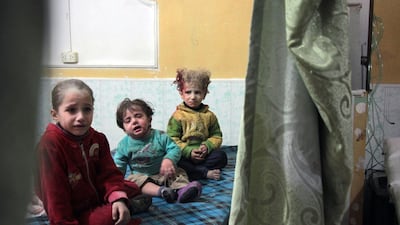Syrians in the besieged enclave of Eastern Ghouta are so short of food that they are eating trash, fainting from hunger and forcing their children to eat on alternate days, the UN World Food Programme said in a report on Wednesday.
Since September, approximately 174,500 people in the town of Douma in the besieged zone have been forced to adopt emergency "coping strategies", the WFP report said.
"This includes consuming expired food, animal fodder and refuse, spending days without eating, begging and engaging in high risk activities to get food. Moreover, many hunger-induced fainting episodes have been reported among school children and teachers."
At least four people have died from hunger, including a child in Douma who took his own life due to hunger, said the report, which was based on a mobile phone survey and information from contacts on the ground.
Forces loyal to President Bashar Al Assad have besieged rebel-held Eastern Ghouta since 2012 and Douma has not had a food aid convoy since receiving wheat flour rations in August.
_______________
Read more:
Putin 'hopeful' of new stage in Syria talks
The perpetuation of Bashar Al Assad's rule is an insult to Syrians who have suffered under him
UN allowing Assad regime to lead Aleppo reconstruction
_______________
Although the area is traditionally agricultural, arable land on the outskirts of Eastern Ghouta is either on the frontline of the conflict or targeted by snipers, the report said.
Last week fighting destroyed recently distributed rations in a storehouse, exacerbating shortages. Although Damascus is only 15 km away, 700 grams of bread is 85 times more expensive in Eastern Ghouta, the report said.
"The situation is anticipated to deteriorate further in the coming weeks when food stock is expected to be totally depleted and household coping strategies will be highly eroded as a result."
Government restrictions meant WFP could only provide a fraction of the food needed. Family food baskets were being shared among six families and were reportedly the only source of food for many female-headed and destitute households, it said.
"Some households are even resorting to rotation strategies whereby the children who ate yesterday would not eat today and vice-versa."
The report quoted a female head of household in Douma as saying she was forced to rotate rations between her 13-year-old daughter and her two- and three-year-old orphaned grandchildren.
"My daughter cries every time I lock her door cause she knows today is not her turn and will sleep with an empty stomach,” she said.

